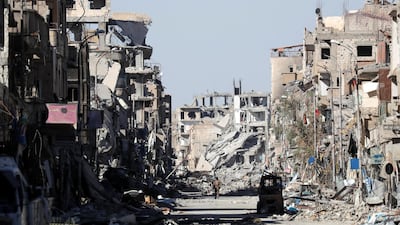Foreign observers touring Raqqa after it was liberated from ISIS last year found their powers of description challenged by what was on display. Almost the entire city – home to nearly a quarter of a million people before the war – had been reduced to rubble. In a place that once hummed with life, the main landmark was the midtown traffic junction where ISIS staged its sadistic public executions. And mass graves and landmines were all that ISIS left behind when its fighters fled the capital of its so-called "Caliphate". The civilians who have since trickled back into the city are still haunted by the reign of terror they endured. The destruction all around them doesn't merely remind them of the recent past; it makes them physically captive to that past.
It is daunting even to contemplate reconstruction under existing circumstances. And yet rebuilding Raqqa is the only way to liberate it, psychologically, from ISIS. This is why the UAE's pledge of $50 million on Thursday to help revive Raqqa – and other areas once under ISIS rule – is so crucial. Other potential donors have been deterred from acting by the ongoing conflict in Syria. But the UAE's donation reminds them that there is an urgent need for intervention – that the obligation to aid the people of Raqqa cannot wait for the arrival of perfect circumstances. Announcing the pledge at Nato last week, Mohammed Al Bowardi, the UAE's Minister of State for Defence, indicated that improving the living conditions in Raqqa will only enhance security.
Eradicating terrorism is rightly a top priority for Nato and the international community, but the focus should also extend to preventing its rise in the first place. Desperate conditions, after all, are ideal breeding grounds for militancy. In Iraq and Syria, ISIS found plenty of recruits among young men who had been abandoned by their governments. Walking away from a new generation, now that ISIS has militarily been vanquished as an organised force, would be a profound mistake – and could lead us to yet more nightmares. It is therefore important to learn from the past and invest generously in places ravaged by terrorism.
The historic monuments vandalised by ISIS were architectural expressions of our civilisation's finest instincts and cultural sophistication. Re-erecting them, brick by brick, affirms our steely determination to preserve our heritage. The UAE's grant of $50 million to rebuild Mosul's Al Nuri Mosque, razed by ISIS as Iraqi forces advanced to liberate the city, is a case in point. As Noura Al Kaabi, the UAE's Minister of Culture and Knowledge Development, has said, this is "an initiative that defeats extremism in all its facets. We don't want to allow the destruction of the past and the present". The two are inextricably connected.

